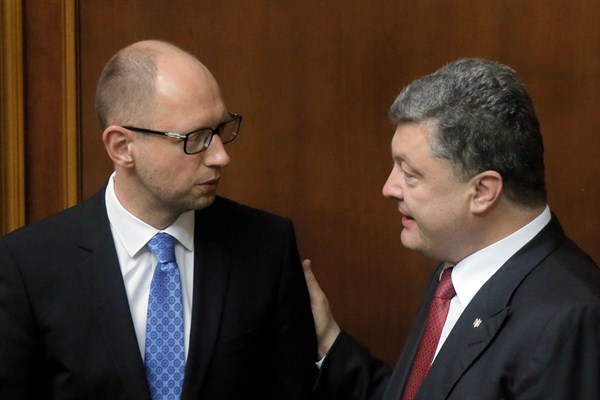Global attention remains focused on the conflict in eastern Ukraine, especially in the wake of the tragic downing of the Malaysian commercial airliner MH17. But in the Ukrainian capital of Kiev, the ongoing war with Russia is only one of several competing priorities. Attempts to restructure and reform Ukraine’s troubled economy have led to a series of political earthquakes. Two weeks ago, the governing coalition, which had been assembled after the Maidan protests drove former President Viktor Yanukovych from power, was dissolved, and Prime Minister Arseniy Yatsenyuk offered his resignation. Then last week, Yatsenyuk’s resignation was rejected by Ukraine’s parliament, the Verkhovna Rada. At first glance, the infamously dysfunctional Rada appears to be as chaotic as ever, even as Ukraine struggles to maintain control of its eastern regions.
But the situation in Kiev may be more stable than it seems. The backdrop for the Rada’s shakeup is a promise made by Ukraine’s newly elected President Petro Poroshenko to hold new parliamentary elections. The public has been demanding a new government ever since Yanukovych fled Ukraine with single-digit approval ratings, but according to Ukraine’s constitution, Poroshenko cannot dissolve the Rada and call for elections unless the ruling coalition collapses. This means the major parties that make up the post-Maidan coalition—former Prime Minister Yulia Tymoshenko’s Batkivschyna, boxing champion Vitali Klitschko’s UDAR and the far-right Oleh Tyahnybok’s Svoboda—have to part ways and compete against each other in elections, likely to take place in October, with the expectation that their cumulative support will grow vis-a-vis Yanukovych’s Party of Regions.
Joanna Rohozinska, senior program officer for Eastern Europe at the National Endowment for Democracy, predicts that UDAR and Svoboda stand to gain the most from new elections. “These two parties have captured the populist mood of the Maidan,” she says. By contrast, Batkivschyna is losing support because Tymoshenko “hasn’t been playing a particularly constructive role. Many people see her as out of touch with political reality since leaving prison. She’s considered a member of the old order.”

